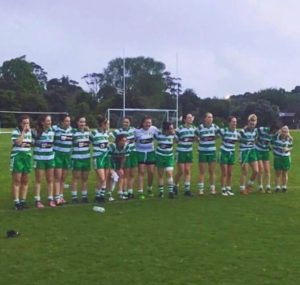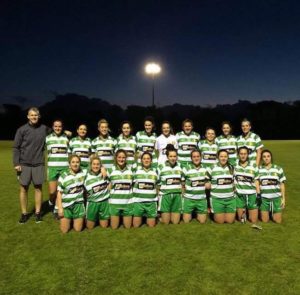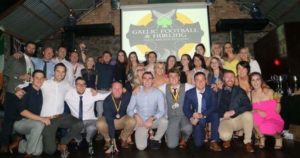I once heard someone describing GAA as ‘a bunch of grown men kicking a lump of leather around a field.’ If that’s all there ever was to GAA, then it would have died out or been replaced with a much more glamorous sport years ago. These days, it seems that more and more are stepping up to cite the downfalls and criticise the advanced development of our amateur sport. However, just like an unhealthy addiction, we keep going back for more, find it difficult to replace and just can’t seem to break loose from its ties. What is it that makes it impossible to walk away from? Well, it’s because the GAA is so much more than the sport itself. It is about the human need of belonging and like it or loathe it, some of us only find our sense of belonging with the GAA. 
Last year I moved overseas to New Zealand. I knew I would miss the obvious – my family, my friends and my community, but not once did it cross my mind that GAA might feature in that list. I promised myself I wouldn’t be one of ‘those people’ that move overseas, play GAA and drink in the Irish bars. No way, not me. I really embraced my new country and way of life and tried my hand at new hobbies and explored many platforms for meeting friends but frustratingly, nothing really seemed to ‘click’ for me. Naturally, living in a new country brought feelings of isolation and anxiety that I wouldn’t settle and every small bump along the way felt like another peak on Rejection Mountain. I could identify what was missing in my life, but I couldn’t seem to figure out how to fill that gap.
Naturally, with time, brought the onset of the GAA season in Auckland. To be honest, I felt reluctant to play and questioned if I would bother, but nothing like obligation and a bit of pressure to make you change your mind. I went through the old familiar routines of packing my kit bag for some pre-season hell. I remember that first night, gassing out doing hill sprints on a muddy field on a cold and dark winter’s night, over 18,000 miles from my home with a bunch of complete strangers. It should have been torturous – but in that moment, something ‘clicked’ and I knew I would be ok. In the GAA, I had found that sense of comfort and belonging that my previous months of stubborn effort just couldn’t fill. As human beings we have a deep-seeded need to belong. To belong to a community, church, organisation or club. We’ve evolved from cavemen with an internal need to live in a close community and play our own unique role within that group. We can choose to isolate ourselves but ultimately that basic human need will never go away. It comes from within us and it brings out the best in us. For a lot of people in Ireland and overseas, this is where the GAA steps up.
Where I come from, everyone knows everyone, mostly through GAA or religious connections and that put a certain kind of pressure on you growing up, a good kind of pressure. It made you realise your actions had consequences for other people, and those people usually knew your parents. An almighty fear that someone might tell your Da down the club that you were ‘carrying on’ would fill your stomach with dread. At local events, you got tagged as ‘someone’s daughter or sister’ and it was almost like carrying around an invisible identity badge that kept you out of trouble. In my local area, those that generally caused the most trouble growing up were usually the children you didn’t really know, the families that had moved in to the area or those that weren’t particularly attached to any club or organisation within the community. Some might say ‘those with nothing better to be at.’ I would make a correction and say ‘those with nothing to belong to.’
Where do we learn this art of belonging you might ask? Well, from a young age within GAA communities, we see adults volunteer their scarce free time for a cause greater than themselves. We see the GAA have a presence at every stage of our lives – we kit our babies in our team’s colours, we learn the basic skills from our first coaches, we grow and develop, we sacrifice, we commit and then when our bodies can’t be strapped, taped or held together to play any longer, we retire, we coach, sit on committees, we support, we reminisce and even at the end of our lives, we see the GAA have that familiar comforting presence as we say goodbye to this world. Throughout our GAA lifecycle, we watch our community come together to teach, entertain, develop, improve our local area and most importantly, get behind its members, especially in tough times. Where else could you consistently learn these skills at every stage of life? I certainly never learned it in a classroom anyway.
I’m going to push the boat out a little further and say that this sense of belonging within the GAA can save people. For some, it is the only aspect of their lives that helps them feel less isolated, where they stand shoulder to shoulder with the boys and girls – turned men and women from their childhood fighting for the same goal. For some people, those 60 minutes on a Sunday where they get angry, aggressive, elated, disappointed, passionate and fired up may be the only time they have been able to let any emotions out that week. For some people, their association with a GAA club may be the only part of their life where they feel any sense of pride right now. For some people, those 10 minutes analysing their team’s performance might be the only conversation they have had in days. For some, it is the only consistent thing in their lives when everything else is falling apart. It is an escape, a release and a sense of belonging in a world that sometimes we just need to detach from.
Mental Health has been quite a taboo subject in Ireland for many years. It is the elephant that is growing in our room, the one that we never quite get around to talking about. We have the ‘happy-go-lucky’ reputation and the ‘it’ll be grand’ mentality that we can’t seem to shake off. We’re not great at talking about emotions and all the mushy stuff and truly, our strengths lie elsewhere. We are practical and mostly show our love and support through doing, through inclusion and through standing by someone’s side, even when we don’t know the right words to say. Our involvement in GAA provides us with many opportunities to play to these strengths and well-known faces in the organisation such as Alan O’Mara and Ashling Thompson speaking out on their personal experience of mental illness are paving the way in encouraging people to seek support.
International statistics show that one in four of us experience a mental illness at some point in our lives while in Ireland, less than one in ten of us feel comfortable to speak our truth. Due to our introverted but practical nature, I feel that the GAA can be the hideout for many suffering in silence. It is the perfect spot for those who are attempting to break down the walls of isolation and the iron barriers of disarray in their minds through company, inclusion and sense of belonging they receive within their GAA club. While this can help people to an extent, professional help is often required which is the step many struggle to take. While the GAA has led the way in running many recent mental health initiatives, I would love to see the organisation use it’s huge influence across the world to grow and build on this, especially within our youth circles, where our suicide rates are unfortunately forth highest in Europe. While the sense of belonging and inclusion in our GAA can sometimes plaster and heal your wound, it is important to acknowledge that this may not always be enough to address the underlying issues and remediate the problem.
Regardless of where you are in your life – age or stage, gender, background, or location in the world, you will always feel that human need to belong. No man is an island and we all must fulfil our needs, whatever the means. In recent times, we seem to look to fantasy lands of celebrities, influencers and social media to seek inspiration when it is truly only old-fashioned face-to-face interactions and participation that can bring a true sense of belonging. Faraway fields may look greener but organisations such as the GAA that are based within our local communities are best placed to forge connections and build that sense of belonging that we all crave. Although there are natural bonds within clubs in terms of working towards the same goal, it is each person’s own responsibility to look out for the next and to pave that path – first to inclusion and then belonging. 
So the next time you pack your kit, pay in at the gate or squeeze into the stand beside your neighbour, be aware that you’ve got someone else’s head in your hands, someone who may be silenced by their own barriers, someone desperately seeking belonging and someone who prays that you understand that the GAA is so much more than kicking a lump of leather around a field. The body of the GAA breeds belonging but we, its people, are its only voice.
- If you would like to talk to someone for further support regarding your mental health, see your GP or contact:
In Northern Ireland:
Action Mental Health: 0 28 7137 3502
ROI:
Freephone The Samaritans: 116 123 or text 087 260 9090.
National Suicide Helpline (Pieta House): 1800 247 247Sinead is an Occupational Therapist from Armagh currently living in Auckland, New Zealand and working within a mental health setting. She is also trained as a gym instructor, personal trainer and nutritionist. She is a positive mental health advocate and this is reflected through her blog which you can find via the following links.
Website: https://missgymbunny.squarespace.com
Facebook: https://www.facebook.com/smallon90/
Instagram: @sineadmallon90
Twitter: @missgymbunnyImages courtesy of Celtic GFC, Auckland, New Zealand



Excellent blog. It’s okay not to be okay! Well written Sinead!
Exactly Cairn.
Well written sinead ,good luck in Auckland
Absolutely fantastic Sinead…..good luck in NZ xxx